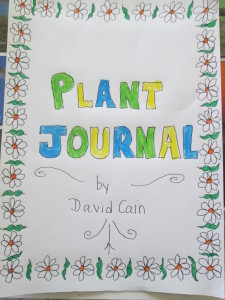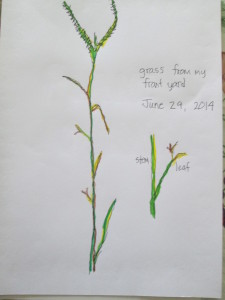Summer is a great time to observe plants. One of the key places Science and Art come together is in the realm of natural science. There is a long tradition of botanical drawings– which have often been used as illustrations for scientific texts. Since it is summer, when things are growing and changing so quickly, it would be a great idea to keep a plant journal. All you need is a blank booklet and drawing tools (a pencil would be fine). For older children, sketching first with a pencil then following up your outline with a pen would be ideal. This would allow you to add color to your drawings (watercolors or watercolor pencils work well) while keeping the lines and other details intact. Here’s a public domain botanical illustration:
Learning to do observational drawings is a valuable — I would say essential — skill for children to learn. Instead of walking by a rose bush and hardly paying it any mind, a child has to stop and spend time, really getting to know and appreciate the details of the plant. When you ask a child to draw grass in a typical picture, they’ll take any green crayon and scribble in green. Children these days are used to the quick pace of video games and other electronic pursuits. As a classroom teacher, I observed that the children who succeeded the most were the ones who were able to change gears, slowing down in order to solve a problem or read a passage carefully. The activity of really taking time to observe and record what a plant looks like is a great exercise in exactly this skill.
What should you use as a journal? The simplest would be pages stapled together with a nice child-made cover. You can also purchase smaller size blank books in the office supply section of any supermarket. If you want your pages to have that old-time paper texture, you might try some parchment paper (usually sold near where they sell wax-paper in a supermarket).
Choosing the plant to observe and draw is very important. If a plant is too complicated, it may be frustrating for a child to draw. A page could be devoted to a tree, including a separate enlarged drawing of a leaf, and perhaps a rubbing of the bark. Almost everyone I know has a camera with them — go on a short nature walk around your yard or neighborhood and take some pictures. If you can download them on a computer at home, so much the better. That way, your “budding” artist can work inside when the weather is too hot.
In art class, I always had children do a sketch first, just to get used to the whole process before they started the real project. Again, doing this you are helping your child adjust her speed to do a better job on the project. You can always use some recycled paper to do sketches.
For the cover of your plant journal you may choose simply to write the words “Plant Journal” and then write your name below “by David Cain.” I encourage you to make your cover eye-catching and colorful. If you want to make a fancier cover, you may include a border using a pattern of plant parts.
The best coloring tools for smaller areas are colored pencils, and fine-tipped markers. Even crayons will work, as long as they have fairly sharp ends to them. For coloring your plant parts, colored pencils work about as well as anything I can think of. If you’d like to use watercolors with your penned outlines, that’s great. Just be sure you’ve had some previous experience with watercolors before you start working over your carefully drawn lines.
Note to Kids: For each entry, write down the date and where you made the drawing. Get help from a grownup to help you. (This does not mean doing it for you)! Draw a separate picture of specific plant parts. Try to label them if possible. Plan ahead so that your page will be filled with different parts of your plant. You might want to record the height of your plant. You may even do a close-up drawing of any animals that are on the plant. Make your parts big enough so that people can see the details. Leaves, for example, have incredibly different shapes.
A variation of this basic idea would be following the same plant throughout the course of the year.
The bottom line is: this is a project which can be as simple or as fancy as you would like to make it. In addition, activity can be adjusted for kids of different ages. Good luck! Let me know how it goes.
Question of the day: What is the earliest known example of a botanical drawing? Who made it? When?
Note to those who wish to post a comment: Please limit yourselves to comments having to do with the content of this blog.
Thank you! –DC



Recent Comments